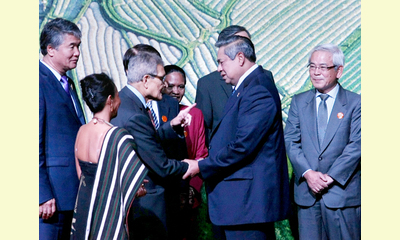|
|
At World Culture Forum, a Call for Openness and Understanding (Indonesia)
un article par Ezra Sihite, Jakarta Globe
Delegates from 45 countries have come together for
the first World Culture Forum in Bali, an event
organized by the Indonesia’s Education and Culture
Ministry and the United Nations Educational,
Scientific and Cultural Organization, aimed at
promoting culture as key in the establishment of
sustainable ties and development among nations.

President Susilo Bambang Yudhoyono greets Nobel laureate Amartya Sen at the first World Culture Forum in Bali on Monday, Nov. 25, 2013. (JG Photo/Afriadi Hikmal)
click on photo to enlarge
“We already have a World Economic Forum and the
World Social Forum for critical discussions on
globalization and all its aspects. However, we are
yet to have a global forum for meaningful
dialogues on the importance of culture,” said
President Susilo Bambang Yudhoyono at the opening
of the WCF on Monday. “This forum will discuss in
depth how culture can contribute to achieving
sustainable development.”
He said the WCF would serve as a platform on which
nations could build mutual understanding as well
as better appreciate cultural diversity. “This
World Culture Forum is designed to complement and
strengthen existing initiatives, including those
under the framework of UNESCO,” Yudhoyono said,
highlighting that the platform should also
contribute in boosting local and national cultural
communities to grow amid globalization.
According to the organizers, the forum has drawn
up to 800 participants from 45 different
countries. “There are also 17 government
ministers [from different countries],” Education
Minister Mohammad Nuh said, adding that he hoped
the forum would provide room for nations to
exchange information on their cultures. Also
present at the event was Indian economist and
Nobel laureate Amartya Sen, as well as prominent
Indian-American journalist Fareed Zakaria, who
were invited as keynote speakers, among other
panelists.
During his opening speech, Yudhoyono emphasized
that culture should become an important source of
income for citizens of a nation. He cited a UN
report that showed that cultural and creative
industries represented one of the most rapidly
expanding sectors in the global economy with a
growth rate reaching 9.7 percent in Asia, 13.9
percent in Africa, 17.6 percent in the Middle
East, 11.9 percent in South America and 4.3
percent in North and Central America. “Indonesia
has taken a number of measures to make culture a
driver of sustainable development. This includes
the development of sustainable cultural tourism
and cultural infrastructure,” he said.
Additionally, the president said that culture was
also critical for nations to maintain stability
and order, elements important to development
efforts. “Today, there are countries which remain
under conflict … therefore, nurturing a culture of
peace is essential to achieving sustainable
development,” he said.
Nuh echoed Yudhoyono’s statements and said culture
could be used as a tool to tackle various social
issues. “Through culture, people will live life in
harmony,” he said.
According to Nuh, the idea of holding a World
Culture Forum was first conceived in 2005. The
event, he said, is hoped to promote culture not only
as an element of social connectivity but also as a
supporting element to strengthen globalization.
UNESCO director general Irina Bokova expressed her
support for the event, emphasizing the importance of
culture in today’s civilization.
|








|
DISCUSSION
Question(s) liée(s) à cet article:
Will UNESCO once again play a role in the culture of peace?,
* * * * *
Commentaire le plus récent:
It is very appropriate that this new impulse for the culture of peace at UNESCO should come from Côte d’Ivoire, since the global movement for a culture of peace was initiated at a UNESCO conference in that country in 1989. See Yamoussoukro and Seville in the early history of the culture of peace.
Note added on September 2:
The official reports from the UNESCO Conference in Abidjian are now available:
English
French

|
|









